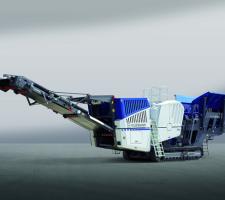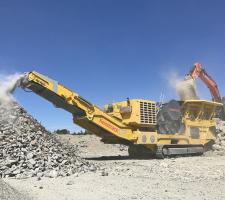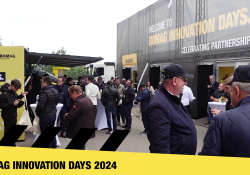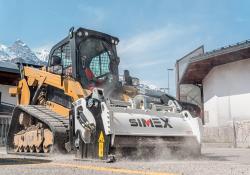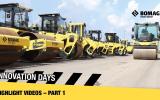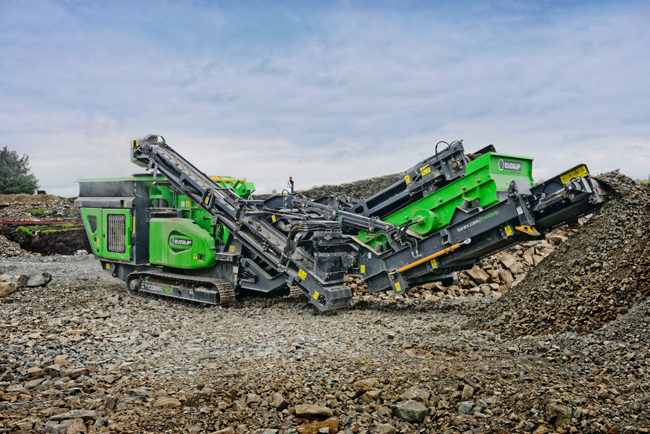
New developments in crushing and screening equipment as well as washing technology will deliver benefits for materials production - Mike Woof writes
Competition is tough in the market for quarry material processing equipment, with key firms introducing new systems that are said to boost capacity and performance. Firms offering crushing and screening equipment have expanded their respective ranges, offering additional capabilities for these segments. Mobility and versatility have been key factors in the development of new models, with many firms also offering new options in the shape of electric and hybrid drive systems.
Meanwhile, there has been growth in the market for washing systems, with customers being offered a wider range of plants from an increasing number of suppliers.
Crushing
The compact Cobra 290R closed-circuit impact crusher is versatile, easy to use and can operate in demanding applications. The track and crush feature is standard, so the operator can move the machine using the optional remote control without shutting down the crusher. The Cobra 290R uses a 235kW engine that is mounted directly and allows a maximum throughput of up to 290tonnes/hour.
Also offered by Kleeman are its new ECO Noise and ECO Dust features on the up to 450tonnes/hour MOBIREX MR 130 Z EVO2 mobile impact crusher, allowing operation in urban areas. The systems cut jobsite noise and dust levels. The plant LSO features Kleemann’s SPECTIVE crusher control system, with a touch panel featuring clear symbols to identify functions, helping simplify operation.
such as producing aggregates for road construction, asphalt, and concrete fractions. The LT200HP complies with European Stage V emissions regulations. The Metso Lokotrack Urban range is ideal for crushing in densely populated environments, such as city centres. It enables up to 60% better noise protection and cuts dust emissions.
Rubblemaster says it is looking to beat its record sales of 2018 during this year. The company bought the Northern Irish firm Maximus during 2018 and has now fully integrated this business into its operations.
Gerald Hanisch is CEO of Rubblemaster and explained that new product development has been a focus for the firm. He commented, “We will bring some new approaches to the industry.” And he said that new models featuring electric drive technology are being introduced, along with a number of other innovations.
The firm plans to boost North American sales for 2019, benefiting from the extended distribution network as well as its parts and service hub in Nashville. With the novel RM120 model having been proven in the European market, the firm is also looking to benefit from its sales in North America.
The
The CH440 is versatile and reliable, and is designed to be easily serviced so that the user can maximise uptime. The Automatic Setting Regulation control system (ASRi) enables real-time performance management, providing a machine that consistently runs at optimum levels. The Hydroset system ensures safety and provides setting-adjustment functions, while the ASRi package automatically adapts the crusher to feed conditions. The Unibody mainframe ensures structural strength and lowers maintenance and the CH440 weighs 14.3tonnes. The 220kW unit offers a nominal capacity of 50-388tonnes/hour and can handle feed sizes of 80-215mm.
Stacking & screening
Haver & Boecker’s Pulse vibration analysis service program is said to ensure aggregate customers benefit from optimum vibrating screen performance. Pulse detects unexpected resonances that could result in lower performance, decreased efficiency and increased operating costs for the screen. Pulse provides the hardware and software to record vibrations on the machine. Data is transmitted to
The Pulse system uses an industrial-grade tablet computer that connects wirelessly with eight tri-axial sensors. The sensors attach to key places on the equipment and provide up to 24 channels of data, with the tablet displaying operating parameters and data being stored.
Keestrack’s sophisticated new track-mounted stacker, the S5e Solar, is equipped with solar panels to recharge the machine’s battery. The photovoltaic panels span out over the machine’s conveyor belt, providing up to 9kW for recharging. If there is bad weather or continuous operation exceeds solar recharging capacity, the system can be recharged via diesel-electric crushers and screens, or a mains supply.
The firm claims that its e-technology plant can reduce energy costs by up to 80% compared to traditional diesel-hydraulic models, while noise levels can be lowered by as much as 30%. The manufacturer says there is a 10-15% higher initial investment for ‘e-technology’ stackers and screeners and 15-20% for large mobile crushers.
McCloskey International’s tracked radial stacker is said to allow operators to switch from tracks to wheels in minutes. The novel ST80T Radial is a patent pending design and features built-in levelling indicators that allow operators to position the stacker regardless of the terrain. Independent hydraulic jack legs stabilise the machine while a level gauge allows operators to position the stacker for maximum production.
A hydraulic raise/lower arm allows the switch from track to radial mode and the machine features a rear counterweight for stability. The ST80T Radial’s tool-free transport design allows the equipment to move from site to site without needing to remove the wheels.
Washing
CDE Global is offering its new Combo all-in-one wet processing plant worldwide. The firm claims that the patented Combo wet processing solution can deliver in-spec washed products from a wide range of feed materials, and can be used in the construction, C&D waste recycling, industrial sands and environmental sectors.
It has been designed to be compact, with all essential processes housed on one chassis. The Combo system operates as a pre-assembled unit and incorporates an integrated control panel. A major feature is the patented swivel access to the pump, which is designed for single-operator use and ease-of-access for maintenance.
Sean Loughran is director of
According to Loughran, the system is more compact than a conventional washing plant as there is no need for tailings ponds.
Superior Industries is introducing its new Alliance Low Water Washer. The technology allows crusher plant operators to wash fines within the crushing circuit, eliminating the need to transport the fines to a separate wash site.
With a 272tonnes/hour throughput capacity, the Alliance Low Water Washer accepts a dry feed from the crushing circuit. An agitator converts the material to a slurry before an integrated dewatering screen removes excess water, leaving as little as 8% moisture in the discharged manufactured sand. Superior says existing units have required as little 45-90m³/hour of water, depending on production rates.

